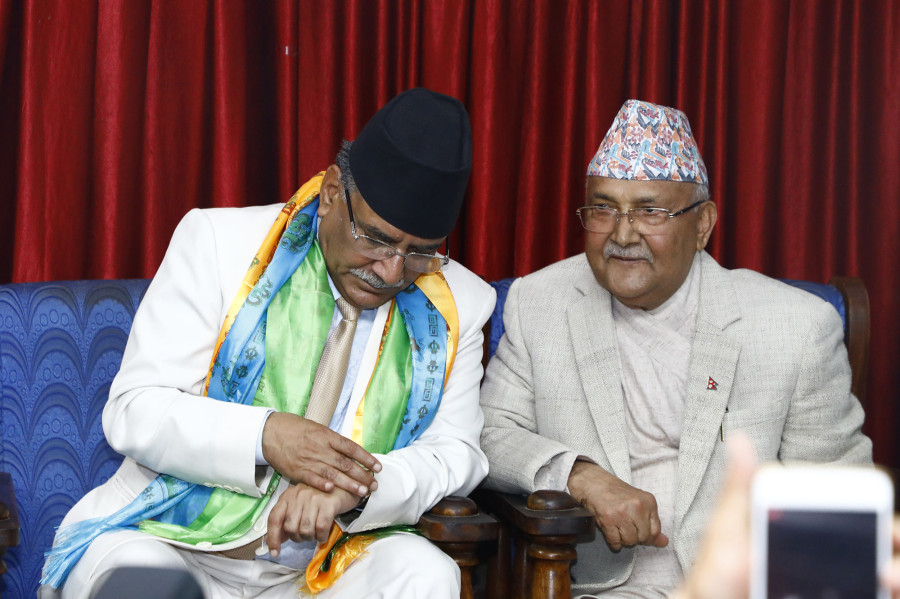Politics
Over a year since unification, ideological differences appear in ruling communist party
Nepal Communist Party leaders seem divided over whether the party should follow the erstwhile CPN-UML’s political ideology or the Maoist Centre’s
Tika R Pradhan
A crucial meeting of the ruling Nepal Communist Party ended inconclusively on Tuesday but clear signs of a brewing conflict between the leaders of the two communist forces that merged in May last year to form one communist force have emerged.
The meeting had been called to finalise divisions over work for central party members, pick heads of the party’s various departments, and form the politburo, a committee that looks after the party’s political issues. However, the meeting ended indecisively, and on the sidelines, divisions over the party’s ideology began to appear.
The party has not made public its political document, which was prepared in May last year, and some senior leaders have been sparring over which political line to follow—the former CPN-UML’s ‘people’s multiparty democracy’ or the former Maoist party’s ‘21st-century people’s democracy and Maoism’.
In the political document, two parties had decided to say that the Nepal Communist Party’s political line would be ‘people’s democracy’ and its ultimate goal would be ‘scientific socialism’. Leaders had agreed to finalise the unified party’s political line later.
Now, despite opposition from former UML leaders, former Maoist leaders are demanding that the party make the document public.
“Once the document is made public, all will have to follow what it says, and it says people’s democracy,” said Hemraj Bhandari, a central committee member. “Co-chair [KP Sharma] Oli has told his followers to strongly raise discussion in favour of people’s multi-party democracy.”
It appears that the Nepal Communist Party is vertically divided and the two parties stand where they used to before the merger, said Bhandari. “If the political document is made public, it would largely mean abandoning ‘people’s multiparty democracy’ and Oli fears this could invite criticism from his colleagues from the UML,” he said.
The recent debate over the party’s ideology has surfaced on the heels of a growing trust deficit between the two co-chairs—KP Sharma Oli and Pushpa Kamal Dahal.
Last week, Dahal had brought up an agreement he had reached with Oli, as per which, according to Dahal, Oli should pave the way for him to lead the government after 15 months. The agreement states that the two leaders should lead the government in turn—two and a half years each, given the party’s current five-year mandate.
This internal power play is now prompting a discussion over the party line, say party leaders.
“Currently, our party does not have a political line per se,” said Surya Thapa, a central member and close aide to leader Ishwor Pokhrel, who has been strongly in favour of adopting ‘people’s multiparty democracy’, as propounded by the UML’s late leader Madan Bhandari.
“We have not accepted the [Maoist] ‘people’s war’ and leaders do not have the leverage to praise it anymore,” he said.
A number of leaders say that the ideological issue is going to surface stronger in the future as former UML members seem to have completely dominated those from the former Maoist party.
Dahal’s recent statements about the agreement that he had signed with Oli were an outcome of the realisation that his role within the party is shrinking in the party, they say.
Many believe that it is due to this ideological division that Tuesday’s meeting was unable to achieve its goals, including who will head the organisation department, a crucial position in the party.
While Bamdev Gautam, a former senior UML vice-chairman who has been quite critical of Oli, seems to have Dahal’s backing, Oli wants to field Ram Bahadur Thapa, Dahal’s longtime ally, for the post.
If that happens, it will change the entire dynamics of the party as Gautam would side with Dahal and Thapa with Oli, despite them once being from different parties with differing ideals.
Oli is thus advocating for the party to adopt ‘people’s multiparty democracy’ as its ideology, hoping that it will bring the former UML leaders, including Gautam, together.
Communists in Nepal have a fragile history, as they have split multiple times in the past over “ideological differences”.
When the UML and the Maoist party decided to form an electoral alliance in 2017, leaders had said they wanted to put such differences to rest, once and for all, and form a grand communist force that would be an example to the world. Their unification seems to have worked, as the two parties received a huge mandate in the last elections and the unified Nepal Communist Party is now governing the country.
However, it appears that the old communist spectre refuses to die.
Ghanshyam Bhusal, a standing committee member known as a UML ideologue, said that bringing the issue of ‘people’s multiparty democracy’ at this point in time is nothing but “opportunism” on the part of some leaders.
“The party has adopted people’s democracy as its political line for now,” Bhusal told the Post. “Talking about previous political lines of the two parties will only create further rifts in the unified party.”




 10.12°C Kathmandu
10.12°C Kathmandu















